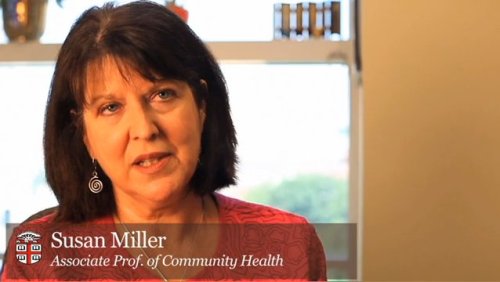Study: Medicare policy may account for growing length of hospice stays in nursing homes
Study: Medicare policy may account for growing length of hospice stays in nursing homes
Hospice care, certified and reimbursed by Medicare, offers specialized end-of-life care in the nursing-home setting. A new study finds that the average length of hospice stays is growing and has doubled in 10 years. A reimbursement policy based on when more hospice care occurs — usually at the beginning and end of a hospice stay — could result in more efficient payment for hospice care than the same daily rate regardless of length of stay.
PROVIDENCE, R.I. [Brown University] — Researchers at Brown University have found that the length of an average Medicare-certified hospice stay in a nursing home has doubled during the last 10 years.
The study, which will appear in the August issue of The Journal of the American Geriatrics Society, evaluated hospice use in U.S. nursing homes between 1999 and 2006. It found the typical treatment time has increased from 46 to 93 days. The researchers cited a standard daily payment rate for most Medicare hospice enrollment days as an incentive for some of the longer stays.
The study also found that the doubling of Medicare services in nursing homes is associated with a 50-percent growth in the number of hospices, primarily for-profit hospices. Currently, one-third of Medicare beneficiaries who die in nursing homes are accessing hospice services, and the study predicts that this number will increase.
——————————————————————————–
…
Susan Miller
A standard daily payment rate for most Medicare hospice enrollment days could be an incentive for some of the longer stays.
Credit: Mike Cohea/Brown University
——————————————————————————–
While the increased availability and use of Medicare-sponsored hospice services was cited as a positive development by the researchers, they are concerned that stays are longest in states with the greatest provider growth. The study raises the possibility that reimbursement policies could be contributing to the volume of these very long stays.
“We undertook this study to inform efforts in Medicare hospice reform,” said Susan Miller, associate research professor of community health at Brown University and lead author of the report. “Although we found a direct link between increases in hospice enrollments and a rise in the number of providers, it is the increasingly long lengths of stay we believe that raise policy concerns. Still, we caution against making sweeping changes to the program, which could deny nursing home residents hospice care. What is needed is a tiered Medicare hospice payment system, which gives higher rates for the beginning and end of the patient’s treatment.”
In addition to changing the rates of payment to reflect the timing of the more intense care needs, the researchers agree with a Medicare Payment Advisory Commission’s recommendation that procedures for determining hospice eligibility recertification be strengthened. The recommended changes would help the Medicare system avoid undue scrutiny of nursing home residents who live beyond the physician-certified six-month prognosis, a Medicare requirement for hospice eligibility, and would allow patients to access the hospice care they need. In 2006, 30 percent of nursing home hospice stays were found to be seven days or less. Currently, 500,000 U.S. adults die in nursing homes each year.
The Medicare hospice benefit is designed to provide visits by an interdisciplinary care team to better manage pain and other end-of-life issues and to provide psychosocial and spiritual support in the nursing home setting for residents and their families. The authors acknowledge the benefits that Medicare hospice provides to these residents and families, while providing data that show a need for modification of the payment system.

Susan Miller, associate research professor of community health at Brown University
* The above story is reprinted from materials provided by Brown University
** More information at Brown University (Providence, Rhode Island, USA)




















